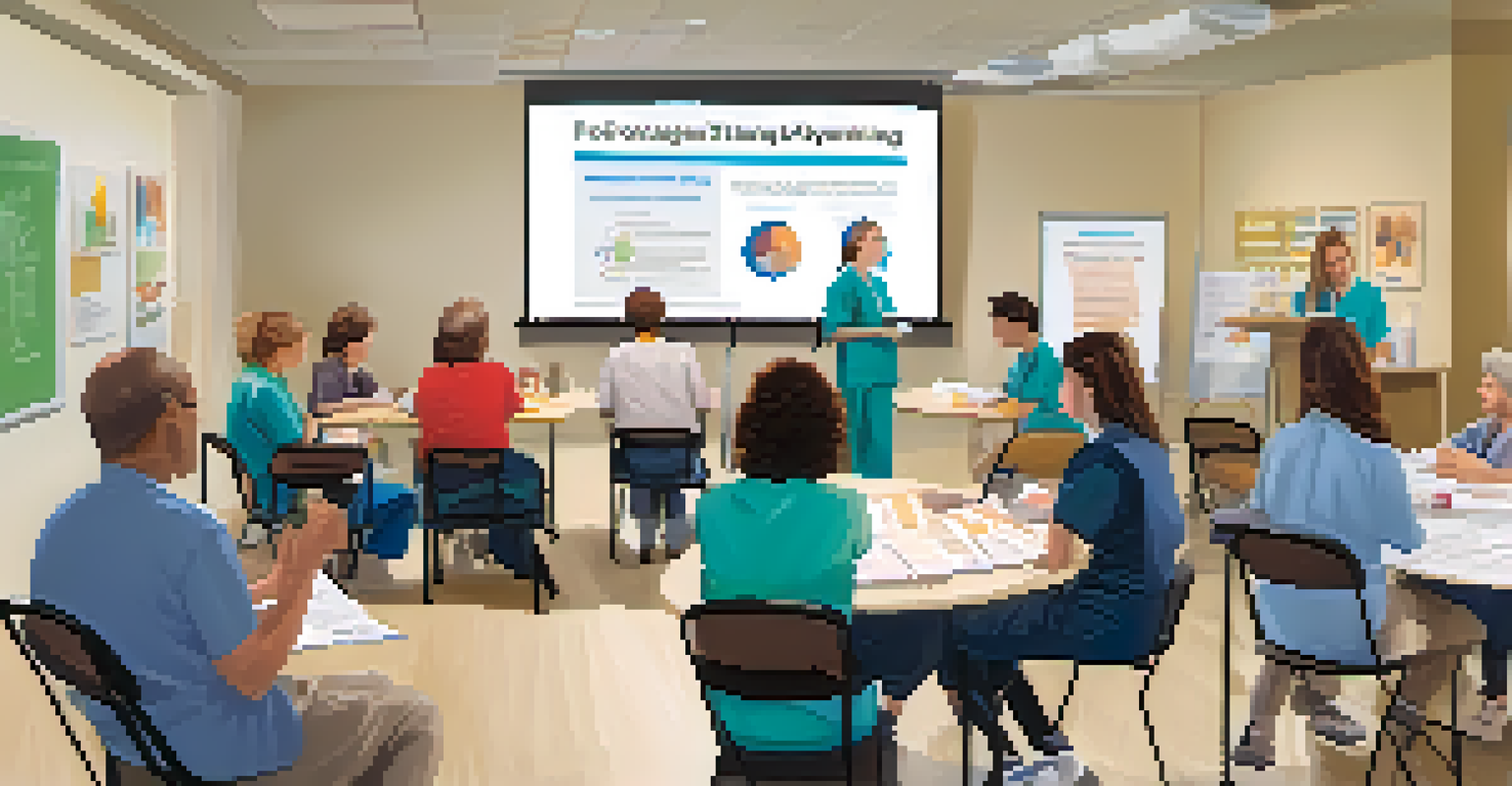The Importance of Food Allergy Training for Caregivers

What Are Food Allergies and Why Do They Matter?
Food allergies are immune system reactions that occur after eating a specific food, such as peanuts or shellfish. For many individuals, these reactions can lead to severe health complications, including anaphylaxis, which can be life-threatening. Understanding food allergies is crucial for caregivers as they play a vital role in the daily lives of those affected.
Food allergies are not just a nuisance; they can be a matter of life and death.
When caregivers are aware of these allergies, they can more effectively manage mealtimes and ensure a safe environment. They need to recognize the symptoms of allergic reactions, which can range from mild hives to severe respiratory issues. This knowledge not only protects the individual with the allergy but also reduces anxiety for everyone involved.
In short, food allergies are serious, and understanding their implications is the first step toward creating a safe space for those affected. Caregivers must educate themselves on this topic to provide the best care possible and be prepared to act swiftly in case of an emergency.
The Role of Caregivers in Managing Food Allergies
Caregivers are often on the frontline when it comes to managing food allergies. They prepare meals, supervise snacks, and often share meals with those they care for, making their role incredibly significant. This daily involvement means that caregivers must be vigilant and proactive to prevent allergen exposure.

Being informed about food allergies allows caregivers to read labels carefully, understand cross-contamination risks, and communicate effectively with others about dietary restrictions. For instance, a simple miscommunication at a potluck or a birthday party could lead to a serious allergic reaction. Therefore, caregivers must be equipped with the right knowledge and tools.
Caregivers are Key to Safety
Caregivers play a vital role in managing food allergies by being proactive and vigilant in preventing allergen exposure.
Ultimately, the role of caregivers extends beyond basic support; they become advocates for the individuals they care for. This advocacy is rooted in their understanding of food allergies and their commitment to ensuring a safe and inclusive environment.
Why Food Allergy Training is Essential
Food allergy training provides caregivers with the necessary skills and knowledge to handle food allergies confidently. This specialized training covers critical topics such as recognizing allergic reactions, administering emergency medication like epinephrine, and understanding the importance of allergen-free zones. Without proper training, caregivers might feel overwhelmed and uncertain during an emergency.
An ounce of prevention is worth a pound of cure.
Moreover, training sessions often include real-life scenarios and practical exercises, reinforcing the information learned. This hands-on approach helps caregivers feel prepared and reduces the likelihood of panic during an actual allergic reaction. Just like learning CPR, food allergy training can save a life.
In essence, food allergy training empowers caregivers to take charge of situations that could potentially be dangerous. It equips them with the tools they need to act swiftly and efficiently, ensuring the safety of those in their care.
Recognizing Symptoms of Allergic Reactions
One of the key components of food allergy training is learning to recognize the symptoms of an allergic reaction. Symptoms can vary significantly from person to person, and they can manifest quickly—sometimes within minutes of exposure to an allergen. Common symptoms include hives, swelling, difficulty breathing, and gastrointestinal issues.
For caregivers, being able to identify these symptoms can mean the difference between life and death. For example, recognizing that a child is experiencing an allergic reaction and knowing how to respond can provide critical time for medical intervention. This awareness is not just beneficial; it’s essential.
Training Empowers Caregivers
Food allergy training equips caregivers with essential skills to recognize symptoms and respond effectively during allergic reactions.
Furthermore, understanding these symptoms fosters better communication between caregivers and individuals with food allergies. When caregivers can confidently identify and articulate symptoms, they can ensure timely medical attention, creating a safer environment for all.
The Impact of Food Allergies on Daily Life
Food allergies can significantly affect the daily lives of those who suffer from them, as well as their caregivers. Simple activities like dining out, attending social gatherings, or even preparing meals at home can become complex challenges. Caregivers need to navigate these hurdles while remaining supportive and understanding.
For example, when planning a family outing, caregivers must consider food options that are safe for individuals with allergies. This might mean calling restaurants ahead of time or packing allergen-free snacks. Such considerations can be time-consuming but are vital for ensuring everyone has an enjoyable experience.
Recognizing the impact of food allergies on daily life helps caregivers become more empathetic and proactive. When they understand the challenges, they can better anticipate needs and create solutions that foster a sense of normalcy and safety for those they care for.
Creating a Safe Environment for Allergy Sufferers
Creating a safe environment for individuals with food allergies involves more than just awareness; it requires active measures and precautions. Caregivers can implement specific practices, such as maintaining allergen-free zones and properly labeling food items. These steps help minimize the risk of accidental exposure.
For instance, in a shared kitchen, caregivers can designate a specific area for allergen-free foods and ensure utensils and surfaces are thoroughly cleaned after use. This simple act can greatly reduce the risk of cross-contamination. Additionally, caregivers can educate family members and friends about the importance of respecting these boundaries.
Ongoing Education is Crucial
Continuous learning and support for caregivers are essential to keep them informed about the latest practices and research on food allergies.
By fostering a culture of safety and awareness, caregivers not only protect the individual with allergies but also create a more inclusive environment. This proactive approach builds trust and peace of mind for everyone involved, allowing for a more harmonious living situation.
Ongoing Education and Support for Caregivers
Food allergy training is not a one-time event; ongoing education is essential for caregivers to stay informed about the latest research and best practices. As food allergies can change over time, caregivers should seek out regular training sessions and updates from health professionals. This commitment to learning ensures they remain equipped to handle any situation that arises.
Additionally, support groups and online forums can be invaluable resources for caregivers. Sharing experiences and strategies with others who understand the challenges can provide emotional support and practical tips. It’s a reminder that they are not alone on this journey, and collaboration can lead to better outcomes.

In conclusion, ongoing education and support are vital for caregivers managing food allergies. By prioritizing continuous learning and connecting with others, caregivers can enhance their confidence and competence, ultimately benefiting those they care for.